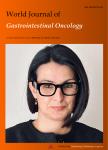Chemotherapy predictors and a time-dependent chemotherapy effect in metastatic esophageal cancer
作者机构:Department of MedicineDivision of Hematology and OncologyCedars-Sinai Medical CenterLos AngelesCA 90048United States Biostatistics and Bioinformatics Research CenterCedars Sinai Medical CenterLos AngelesCA 90048United States Samuel Oschin Cancer CenterCedars-Sinai Medical CenterLos AngelesCA 90048United States Department of MedicineBeth Israel Deaconess Medical Center/Harvard Medical SchoolBrigham and Women's Hospital/Harvard Medical SchoolBostonMA 02114United States Department of Medical Oncology and Therapeutics ResearchCity of Hope Comprehensive Cancer CenterDuarteCA 91010United States Division of Hematology and OncologyDepartment of MedicineUniversity of CaliforniaIrvineCA 92697United States Department of MedicineCedars Sinai Medical CenterLos AngelesCA 90048United States Department of SurgeryCedars-Sinai Medical CenterLos AngelesCA 90048United States Department of Pathology and Laboratory MedicineCedars Sinai Medical CenterLos AngelesCA 90048United States Department of Radiation OncologyCedars Sinai Medical CenterLos AngelesCA 90048United States Department of Radiation OncologyCedars-Sinai Medical CenterLos AngelesCA 90048United States
出 版 物:《World Journal of Gastrointestinal Oncology》 (世界胃肠肿瘤学杂志(英文版)(电子版))
年 卷 期:2022年第14卷第2期
页 面:511-524页
核心收录:
学科分类:1002[医学-临床医学] 100214[医学-肿瘤学] 10[医学]
基 金:Commission on Cancer American College of Surgeons, ACS
主 题:Esophageal cancer Metastatic Chemotherapy Predictors Survival
摘 要:BACKGROUND Chemotherapy has long been shown to confer a survival benefit in patients with metastatic esophageal ***,not all patients with metastatic disease receive *** To evaluate a large cancer database of metastatic esophageal cancer cases to identify predictors of receipt to chemotherapy and *** We interrogated the National Cancer Database(NCDB)between 2004-2015 and included patients with M1 disease who had received or did not receive chemotherapy.A logistic regression model was used to examine the associations between chemotherapy and potential confounders and a Cox proportional hazards model was employed to examine the effect of chemotherapy on overall survival(OS).Propensity score analyses were further performed to balance measurable confounders between patients treated with and without *** A total of 29182 patients met criteria for inclusion in this analysis,with 21911(75%)receiving chemotherapy and 7271(25%)not receiving *** median follow-up was 69.45 *** median OS for patients receiving chemotherapy was 9.53 mo(9.33-9.72)vs 2.43 mo(2.27-2.60)with no *** of diagnosis 2010-2014[odds ratio(OR):1.29,95%confidence interval(CI):1.17-1.43,P value$46000(OR:1.49,95%CI:1.27-1.75,P value0.001),and node-positivity(OR:1.35,95%CI:1.20-1.52,P0.001)were independent predictors of receiving chemotherapy,while female gender(OR:0.86,95%CI:0.76-0.98,P=0.019),black race(OR:0.76,95%CI:0.67-0.93,P=0.005),uninsured status(OR:0.41,95%CI:0.33-0.52,P0.001),and high Charlson Comorbidity Index(CCI)(OR for CCI≥2:0.61,95%CI:0.50-0.74,P0.001)predicted for lower odds of receiving *** the effect of chemotherapy on OS using a time-dependent coefficient showed that chemotherapy was associated with improved OS up to 10 mo,after which there is no significant effect on ***,uninsured status[hazard ratio(HR):1.20,95%CI:1.09-1.31,P0.001],being from the geographic



